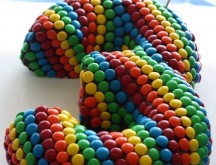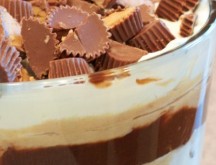As any mother can tell you, the only thing harder than trying to eat healthy is trying to get your kid to eat healthy. Just try giving your kid a side of broccoli for dinner: It doesn’t matter how much cheese you smother it in, odds are it will still end up going to the dog. Going through this cycle night after night can be discouraging. Luckily for you, many companies are developing tasty, healthy alternatives for food, with the promise that these items are chock full of vitamins and nutrients to help child development. Unfortunately for you, many of these so-called “healthy alternatives” are not as good for your kid as they might appear to be.
Using data from FoodFacts.com, we examined three foods that many consider “healthy alternatives” for kids, and we debunked some of the health claims behind them.
1) Annie’s Homegrown Fruit Snacks
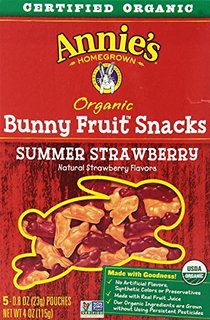 “It says organic, so it has to be healthy.” Right? Wrong. These organic fruit snacks are widely considered healthy because they contain 0 grams of fat (any kind), sodium, and cholesterol. On top of that, they are chocked full of so much Vitamin C, they provide 340% of the recommended daily value. However, these statistics don’t tell the whole story. For starters, these 3 oz. bags of fruit snacks contain 250 calories each, a frighteningly high amount for a tiny bag of gummies. Additionally, each bag is full of 33g of sugar, more than enough to give your kids cavities and send them bouncing off the walls.
“It says organic, so it has to be healthy.” Right? Wrong. These organic fruit snacks are widely considered healthy because they contain 0 grams of fat (any kind), sodium, and cholesterol. On top of that, they are chocked full of so much Vitamin C, they provide 340% of the recommended daily value. However, these statistics don’t tell the whole story. For starters, these 3 oz. bags of fruit snacks contain 250 calories each, a frighteningly high amount for a tiny bag of gummies. Additionally, each bag is full of 33g of sugar, more than enough to give your kids cavities and send them bouncing off the walls.
FoodFacts Grade: C-
2) Snikiddy Snacks Organic Mac n’ Cheese Puffs
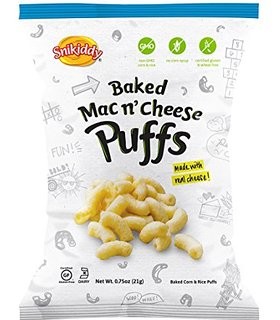 Again, don’t be tempted to fall into the “organic” trap. Just because a food is organic doesn’t mean it’s healthy. While these cheesy puffs may be less harmful than the fruit snacks above, they also carried the added drawback of providing little to no nutritional value. A whole bag contains just under 50 calories, including 12 g of protein and only 20 mg of cholesterol. However, these puffs only contain microscopic amounts of vitamins, and one bag can fill your kid up with over 1000 mg of sodium. Definitely not nutrient-dense, and not a recommended alternative if it can be avoided.
Again, don’t be tempted to fall into the “organic” trap. Just because a food is organic doesn’t mean it’s healthy. While these cheesy puffs may be less harmful than the fruit snacks above, they also carried the added drawback of providing little to no nutritional value. A whole bag contains just under 50 calories, including 12 g of protein and only 20 mg of cholesterol. However, these puffs only contain microscopic amounts of vitamins, and one bag can fill your kid up with over 1000 mg of sodium. Definitely not nutrient-dense, and not a recommended alternative if it can be avoided.
FoodFacts Grade: C-
3) Alta Dena Lowfat Chocolate Milk
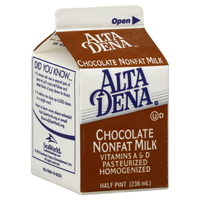 Ah, milk. The one thing kids eat since the day they’re born. It’s full of calcium and vitamins and all sorts of healthy enzymes that encourage strong growth and muscle development. Adding chocolate just adds a little bit of flavor, right? Unfortunately, no. With the lowest score out of all three items listed here, Alta Dena’s chocolate milk is far from healthy. Yes, it does contain substantial amounts of protein, calcium, vitamin a, and vitamin d. And yes, it does contain only 6 g of fat and 30 mg of cholesterol per bottle. But all of those benefits are pretty much offset by the obscenely high amount of sugar and sodium. Almost 500 mg of sodium and more than 60 g of sugar come with each bottle, more than enough to rot your kid’s teeth away. Additionally, the High Fructose Corn Syrup and Carrageenan used as ingredients are widely considered to be controversial ingredients at best.
Ah, milk. The one thing kids eat since the day they’re born. It’s full of calcium and vitamins and all sorts of healthy enzymes that encourage strong growth and muscle development. Adding chocolate just adds a little bit of flavor, right? Unfortunately, no. With the lowest score out of all three items listed here, Alta Dena’s chocolate milk is far from healthy. Yes, it does contain substantial amounts of protein, calcium, vitamin a, and vitamin d. And yes, it does contain only 6 g of fat and 30 mg of cholesterol per bottle. But all of those benefits are pretty much offset by the obscenely high amount of sugar and sodium. Almost 500 mg of sodium and more than 60 g of sugar come with each bottle, more than enough to rot your kid’s teeth away. Additionally, the High Fructose Corn Syrup and Carrageenan used as ingredients are widely considered to be controversial ingredients at best.
FoodFacts Grade: D
The takeaway message here is clear – don’t be fooled by the clever advertising and packaging that, at a glance, suggest certain foods are healthy. Do your research, read the nutrition facts label, and make careful, informed choices about what goes in your child’s body. At the end of the day, fresh, whole foods are going to be the best option, but when you need to reach for a packaged snack, there are low-sugar, nutrition-dense options that are kid-tested and dietitian approved!
